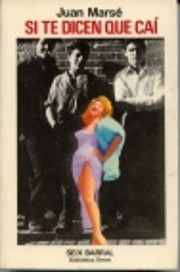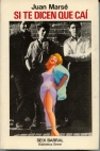

Click on a thumbnail to go to Google Books.
|
Loading... The Fallen (1973)by Juan Marsé
 None No current Talk conversations about this book.  “Las posguerras son siempre más tristes y violentas que las guerras, ya que en ellas las verdades contradictorias de vencedores y vencidos se amalgaman en una suerte de barro sucio y degradante que lo contamina todo. Uno de los grandes aciertos de Si te dicen que caí fue saber transmitir cómo en la posguerra española a la verdad sólo podía llegarse, paradójicamente, por las mentiras, por la imaginación y, en último extremo, por la literatura. Los protagonistas de esta novela, por eso, van inventándose aventis (aventuras) que les incluyen como personajes y que pretenden, en sucesivas versiones o ampliaciones, asediar la verdad del asesinato de una prostituta de lujo en la Barcelona de mediados de los cuarenta. Estas aventis (“el único juguete de los pobres”) intentan reconstruir el mundo y las circunstancias que desembocaron en esa muerte con los desechos de la realidad en la que surgen.” Jesús Aguado De nuevo en el mundo de los arrabales barceloneses, en el contraste entre los ricos y los pobres, en las historias de la niñez y la adolescencia. Ahora con el añadido de viejos republicanos que sobreviven (o no) al franquismo. Pero me ha gustado menos que "Últimas tardes con Teresa", quizá por la experimentación formal, sobre todo en los saltos temporales y de puntos de vista difíciles de seguir a veces, o por la introducción de cierto maniqueísmo (muy leve, en todo caso, comparado con otros autores), o quizá por la escabrosidad un poco artificial de algunas escenas. Pero, aún así, hay que reconocer la capacidad narrativa de Marsé. no reviews | add a review
Belongs to Publisher SeriesClub Bruguera (9)
A masterpiece of contemporary Spanish literature, Si se dice que caí is one of the most ambitious and courageous novels of our time, a stylistic kaleidoscope in which post-war memory reverberates. Written at the end of the sixties and prohibited by censorship, it constitutes a secret and nostalgic farewell to childhood, as well as a sordid and poetic picture of life during Francoism. It is also one of the author's most personal novels, since, according to Marsé himself, when he wrote it he only thought of the anonymous neighbors of a poor neighborhood that does not exist in Barcelona, of the furious boys who shared with him the leprous and atrocious games, fear, hunger and cold, in his own childhood and adolescence. The subtle narrative framework is made up of diverse, contrasting and even contradictory voices, voices that surround the imposture and the equivocation, that weave and unravel a thick web of signs and references and an ambiguous system of echoes and resonances. -- Amazon.com. No library descriptions found. |
Current DiscussionsNonePopular covers
 Google Books — Loading... Google Books — Loading...GenresMelvil Decimal System (DDC)863.6Literature Spanish and Portuguese Spanish fiction 20th CenturyLC ClassificationRatingAverage: (3.7) (3.7)
Is this you?Become a LibraryThing Author. |
||||||||||||||||||||||||||||||||||||||||||||||||||||||||||||||||||||||||||||||||||||||||||||||||||||||||||||||||||||||||